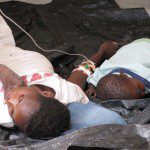Florida Department of Health (FDOH) officials on Wednesday confirmed a case of cholera in a Collier County woman who recently returned from Haiti.
 “We are working with our health care partners to ensure appropriate care of this individual and prevent the spread of this disease within the community,” said State Surgeon General Ana M. Viamonte Ros M.D., MPH. “We will continue to monitor the state for any future cases.”
“We are working with our health care partners to ensure appropriate care of this individual and prevent the spread of this disease within the community,” said State Surgeon General Ana M. Viamonte Ros M.D., MPH. “We will continue to monitor the state for any future cases.”
The case of cholera was identified through the state’s enhanced disease surveillance system and sent to the Centers for Disease Control and Prevention (CDC), where it was confirmed. Travel to and from Haiti has increased since the Haitian earthquake. Relief workers and Florida residents who are visiting family in Haiti are the primary populations making the trip. Travelers who have been exposed in Haiti may become ill with cholera after their return to Florida. The state has asked local health care providers to watch for people who become sick or show symptoms of cholera after returning from travel to Haiti. Further, the Department of Health is encouraging health care providers to administer specific cholera testing in suspected cases and notify FDOH of its laboratory results.
Cholera is a diarrheal disease caused by a bacterial infection of the intestine. The infection is often mild or without symptoms, yet illness sometimes can be severe. In severe cases, the infected person may experience profuse, watery diarrhea and vomiting that can cause rapid loss of body fluids, leading to dehydration and shock. Without treatment, death can occur within hours.
“It is very important for travelers who develop severe, watery diarrhea, or diarrhea and vomiting within five days after return from Haiti to seek medical attention immediately,” Viamonte Ros said. “Rapid treatment is the key to recovery.”
The infrastructure in U.S. water, sanitation, and food systems minimize the risk for fecal contamination of food and water so the potential for spread is extremely low, but still possible. A person can get cholera by drinking water or eating food contaminated with the cholera bacterium. Person-to-person transmission is rare.
Although the potential for the spread of cholera is low, the FDOH wants to ensure high-risk situations such as cholera in a food-handler or clusters of illness are identified, and those affected are provided medical treatment. Suspected cases of cholera should be immediately reported to County Health Departments by doctors, hospitals and laboratories without waiting for laboratory confirmation.
Further, the Department of Health is encouraging health care providers to administer specific cholera testing in suspected cases and notify FDOH of its laboratory results. Family members and caretakers of ill travelers returning from Haiti should wash their hands frequently as they may be at risk of contracting cholera if handling the vomit or feces of an infected person.
The case involved a Collier County woman who had been visiting family in Haiti, said Dr. Tom Torok of DOH’s epidemiology bureau. More suspected cases in other areas of Florida are being investigated, he said.
About 1,000 people have died in Haiti as a result of the cholera outbreak in that country and more than 9,000 have been hospitalized.


